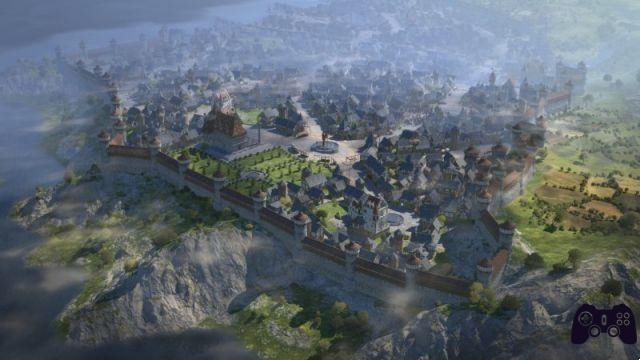Computer role-playing games often completely forget what a role-playing game means. In most cases there is some kind of underlying misunderstanding, so that the only thing that matters seems to be only a small amount of the characters' characteristics, a misunderstanding that, it must be said, has also been cultivated by the players themselves. From time to time, however, despite many difficulties, some development studios try to put the concept of "role" back at the center of the experience, as happens for example in Kenshi, in its own way in Mount & Blade or in the unforgettable Darklands, which, as we will see in wartales review, was one of Shiro Games' main sources of inspiration for its latest game, just released in Early Access, at least on a philosophical level.
Role playing game

The idea behind Wartales is to give the player a system with which to develop their party however they want, giving them a series of characterizing choices to make, which shape not only the characters' background, but also the way they play. The first thing you notice is that there is no real story to follow: you choose the origin of the party (deserters? Peasants in search of fortune? Mercenaries?), the difficulty of the two gods main systems game, that is, combat and survival, the form of the challenge, with the game world that can be fixed or follow the growth of the group and we embark on an adventure, literally. Then you find yourself in a remote location, with no other mission to fulfill than to help the gang survive and prosper, perhaps by growing their numbers and providing them with more horses to transport the loot.
It's up to the player to decide where to go, who to talk to, who to recruit, which missions taking into account villages (fixed, not procedurally generated), often how to run them, and how to manage the reputation of the group. There are no limitations, although, of course, the fact that our men have to travel and demand payments from time to time is an incentive not to sit idly but to continually search for sources of food and income, visiting villages or points of support. interest. (farms, stables, outposts, abandoned towers, etc.) for information and quests.
Please note that the areas where you can enter and talk to other characters are handled as fixed screens. So, for example, when visiting a blacksmith you can negotiate with the owner or interact with the anvil to obtain create objects, when you enter a tavern you will find mercenaries to recruit, a notice board with missions to complete or shady characters who have often not exactly clean tasks to propose to us. By interacting with the merchants you can buy their goods or, if you have a thief in the group, try to steal them and, as you gain fame, you will access more important missions, assigned by prominent characters, with also important encounters when you visit the larger cities. .
Le missions They can also be obtained by visiting the various interactive locations visible on the map and talking to locals about their problems. For example, it may happen that we are asked to escort someone, or recover stolen merchandise, or even kill some criminal who is especially heinous against a certain community. In general, there are a lot of things to do and depending on how they are done they can push the entire group in a certain direction, making it acquire more or less prestige in certain environments (prestige points can be spent to resolve some situations or to get quests).
in the wide world

Wartales takes place mainly in a single, large space. map framed from above, divided into regions, which can be moved by clicking the mouse. After spending some time walking along dirt roads, forests, more or less other mountains, ruins, cities, etc., we will have to let our men rest, creating a camp and giving them food to regain energy and not lose morale. The amount of food needed to feed them varies depending on the selected difficulty level and some features on which the obtained skill points can be spent, but in general it is always advisable to have a good supply of food in the inventory, if not I do not want to have desertions due to dissatisfaction. The same goes for gold: not having enough to pay those who ultimately work as mercenaries can be more dangerous than the enemies themselves. The latter are mostly humans and wild animals.

The world of Wartales is definitely realistic in this sense, so don't expect to run after dragons or ferret men. On the other hand, you will face many groups of humans, whether they are bandits or law enforcement officers. Much depends on how the campaign is carried out. For example, if you decide to follow the path of crime, attacking and robbing caravans passing from one town to another, it is inevitable that you will earn a bad reputation and attract the attention of armed security agents, who will try to kill you on the spot. . first available opportunity.
Mobility also follows the same principle: the map is open and you can go almost anywhere, but it is not possible to avoid some natural obstacles. no fast travel and, in general, it is necessary to develop the party to advance more quickly. Despite this, the game provides systems to shorten some paths. For example, to get down the mountain faster, you can lower ropes by hooking them to the rock, so you don't have to go back completely.
The combat system

Il combat system It's turn-based and fairly classic, with troops acting on initiative, albeit with some unique elements. Thus, at the beginning of the battle, units line up on the battlefield and choose positions according to their preferred tactics. By the way, it is possible to concentrate units in one area, giving them more attack strength, but leaving more room for maneuver to the enemies, or they can be distributed in such a way as to better absorb the number of opponents, but at least the cost of increasing the risks for the individual mercenary. Keep in mind that at the beginning of the game the confrontations are mainly between small groups, but as the hours go by you usually end up in battlefields in which many units are involved, even belonging to multiple factions. In some cases it is also necessary to defend specific units, which must not die for any reason, under penalty of immediate defeat.

In any case, once the battle has started, victory is achieved not only by killing the enemies (which is the main activity anyway), but also by managing the party morale: Losing too many men generates panic, worsens everyone's performance and causes uncontrolled flight of the most sensitive members. The same thing happens to opponents who, when they decide to escape, can let them go or finish them off. It should be noted that these choices also affect the group's fame and some general characteristics linked to certain actions, which allow unique traits to be unlocked.
The fight itself is a confrontation between capacity of the different groups, with the attack or defense options available that vary depending on the class of our men and their equipment. For example, a character with a sword and shield will be able to use an ability to cover enemy blows, to reduce any damage, while someone wielding a warhammer will be able to hit more than a single enemy in an area.

Consider that Wartales also includes the fire friend, which becomes part of the party's management not only because it harms the characters, but also because it changes their relationships. Thus, for example, an archer who misses his aim and hits his partner, without considering the trajectory during the attack phase, could create a certain bad mood (no one likes arrows in the knees, especially friendly ones) , just like a brute who struck blindly with his two-handed weapon without much regard for the target. In this sense, the Shiro Games title remains coherent and links each system to the micromanagement of the group, that is, it provides direct and very clear consequences for each action performed by the player, to make the entire game more enjoyable. interesting and deep.
Character growth

Everything is reflected in one. character growth very complex, depending on their characteristics, their class and their profession, as well as the way they interact as a group, which creates small narrative moments during the rest phases, with the different members expressing themselves about some general themes and behavior in the field. . Thus, the player must not only allocate the points obtained by each individual member of the group, growing their characteristics and choosing combat-related skills, which vary by class, but must also give guidelines to the mercenaries, spending points for some . collective characteristics, linked to the group's modus operandi and individual professions. For example, in a group with a blacksmith, you can increase the number of items that can be created at forges (raw materials must be purchased or found, legally or illicitly), while if there is a cook in the group, you can You can increase the recipes that can be cooked (cooked foods are more nutritious than raw foods). If you want, you can also choose to have a group of cannibals, making the corpses of your opponents excellent raw material (for the series that does not throw anything).
Some problems

Overall, Wartales works very well and can be a really immersive experience, but not without problems. The most obvious thing, especially at the beginning, is having to go back and forth too much between discovered locations to get rewards and buy resources. Considering how quickly our men get tired, in some cases we can end up creating loops in which they carry out missions only for the basic sustenance of the group, therefore to buy food, repair equipment and things like that, without receiving anything real. progression, which is not exactly pleasant. It must also be said that the game world seems too generic, with some situations only sketched but that would have deserved a deeper analysis, perhaps with a nuanced but more complex narrative campaign, to give more presence to some themes. Let us think, for example, about power relations in various territories or the issue of refugees with related public order problems. Even some stories related to certain missions would have deserved more attention. After all, the goal of Shiro Games has always been to create a game system that is as open as possible in which the player, despite the presence of fixed elements, could develop their adventures as they wish. In this sense it cannot be said that Wartales is not a successful title.
Conclusions
Tested version PC with Windows digital delivery Steam Price 34,99 € Holygamerz.com 8.0 Readers (14) 9.2 your voteWe played Wartales for about seventy hours, wanting to play it again to try to manage the party in a completely different way. This is probably the best praise we can give to the game by Shiro Games, which after Evoland and Northgard has created another gem, perhaps a little rough in certain aspects and with some slightly annoying problems, but which is certainly worth playing and its original way. when approaching the role-playing game genre.
PRO
- Development of the free match
- It feels like you're really playing a role.
- Many things to do
AGAINST
- You often regress, especially at the beginning.
- Negative loops can be created that strangle the game.






